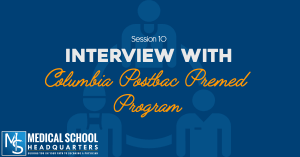
In today’s episode, I talk with Dr. Victoria Rosner, the Associate Dean and Coordinator of Academic Affairs at Columbia University’s Postbac Premed Program. Dr. Rosner leads the advising team in support of students in Columbia’s postbac premed program.
Columbia University was the first postbac program in the country, and it remains the largest, with close to 500 students in the program. Most of these postbac students are career changers who have never taken science classes. Many have had successful careers in other industries before realizing they wanted to dedicate their lives to being healers.
Today, we discuss the growing popularity of postbac programs across the country, the types of students Columbia is looking for, and the immense support the school is offering to help their students really excel in their passion.
Listen to this podcast episode with the player above, or keep reading for the highlights and takeaway points.
[Related episode: Almost Everything You Need to Know About Postbac Programs]
[Related episode: What Should I Do During My Gap Year?]
[Related episode: What Can I Do If My GPA Is Too Low for a Postbac Program?]
There are times when what you’re learning as a premed feels disconnected from the future that you imagine for yourself as a medical provider. Find a way to spend time in clinical settings (shadowing, volunteering, etc.) to get yourself out into the world of health care and use that as the engine to drive you through your studies.
There are many postbac programs out there. Find the program that works for you.
Find a way to spend time in clinical settings (shadowing, volunteering, etc.) to get yourself out into the world of health care and use that as the engine to drive you through your studies.Click To Tweet
Lorem ipsum dolor sit amet, consectetur adipiscing elit
I just received my admission to XXXXX! This is unreal and almost feels like I am dreaming. I want to thank you for all of your help with my application. I cannot overstate how influential your guidance and insight have been with this result and I am eternally grateful for your support!
IM SO HAPPY!!!! THANK YOU SO MUCH FOR ALL YOUR HELP, IM INDEBTED TO YOU! Truly, thank you so much for all your help. Thank you doesnt do enough.
I want to take a few moments and thank you for all of your very instructive, kind and consistent feedback and support through my applications and it is your wishes, feedback, and most importantly your blessings that have landed me the acceptance!
I got into XXXXX this morning!!!! It still has not hit me that I will be a doctor now!! Thank you for all your help, your words and motivation have brought me to this point.
I wanted to once again express my heartfelt gratitude for your help in providing feedback during my secondary applications. Your guidance has been instrumental in my journey.
Just wanted to share my wonderful news! I received my first medical school acceptance! Thank you for all that you do for us Application Academy!!!
I am excited to tell you that I just got my third interview invite from XXXXX today! I can’t believe it. I didn’t even know if I was good enough to get one, let alone three – by mid-September. Thank you so much for all of your help and support up to this point; I would not be in this position without it!!
I wanted to thank you for helping me prepare for my XXXXX interview. Even in a 30-minute advising session, I learned so much from you. Thank you for believing in me, and here’s to another potential success story from one of your advisees!
I just received an acceptance with XXXXX! This is so exciting and such a huge relief and so nice to have one of our top choice schools! I also received an interview with XXXXX which brings the total up to 20 interviews! Thank so much, none of this would have been possible without you!

Join our newsletter to stay up to date
* By subscribing you agree to with our Privacy Policy and provide consent to receive updates from our company.
Resources
Advising Services
Podcasts & Youtube
Books
About
"*" indicates required fields